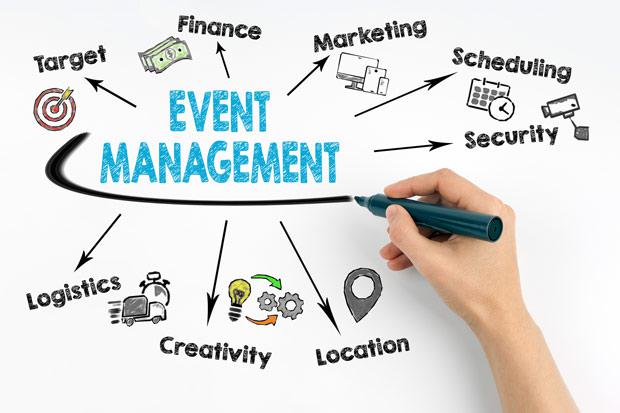Visibility boosters used by charlotte event companies to drive engagement
Wiki Article
Recognizing All About Event Management and Its Function in Successful Events
Event management is a vital consider the execution of successful celebrations. It includes careful preparation and control to ensure that every aspect lines up with the designated vision. From corporate events to social events, the performance of occasion management can substantially affect guest experience. Understanding the subtleties of this field exposes even more than simply logistics - charlotte event companies. The intricacies of communication, budgeting, and assessment play important roles fit results. What are the crucial aspects that truly drive success?The Relevance of Event Management
Event management plays a necessary role in guaranteeing the success of any event, whether it be a corporate seminar, wedding, or celebration. It encompasses the preparation, organization, and execution of events, which requires meticulous focus to information and an organized method. Effective event management assists create memorable experiences for participants, fostering interaction and complete satisfaction.Effective occasion management can enhance source appropriation, assuring that spending plans are adhered to while maximizing the impact of the occasion. It involves collaborating numerous elements such as location option, distributor management, and logistics, all of which add to a smooth experience.
Additionally, reliable event management can mitigate potential threats and obstacles, preparing for unanticipated issues that may emerge. By prioritizing interaction and collaboration among stakeholders, event managers can guarantee that objectives are satisfied, leading to successful outcomes and positive feedback from individuals. Eventually, the importance of event management depends on its ability to transform visions right into truth.
Secret Parts of Event Planning
In event planning, numerous essential parts are important for success. Budget management strategies, place selection ideas, and timeline development basics create the foundation of an efficient plan. Each of these elements plays a significant role in guaranteeing that an event runs efficiently and meets its objectives.
Spending Plan Management Strategies
Efficient budget plan management is a keystone of effective event planning. It includes careful appropriation of resources to assure that all elements of the event are adequately moneyed. An extensive spending plan must include groups such as venue, wedding catering, amusement, marketing, and backup funds for unanticipated costs. To maintain monetary control, coordinators must track expenditures closely and routinely contrast them against the budget. Making use of budgeting software can improve this process, giving real-time updates on monetary status. In addition, obtaining numerous quotes from vendors can aid identify cost-effective services without compromising top quality. By establishing clear concerns and sticking to a well-structured budget, occasion managers can navigate economic difficulties and improve the total success of the event.Place Selection Tips
Picking the ideal location is crucial for any effective occasion, as it sets the stage for the general experience. When selecting a venue, occasion organizers should take into consideration elements such as place, ability, and availability. The venue should be quickly reachable for attendees, preferably situated near transport alternatives. Additionally, the dimension needs to fit the expected number of visitors conveniently, with area for any organized tasks. Organizers need to additionally examine the location's services, consisting of audiovisual tools, seating plans, and catering options. Budget plan restrictions play a substantial function; therefore, recognizing the overall expenses, consisting of surprise costs, is essential. Checking out the venue in advance allows for a firsthand examination and assists guarantee it straightens with the event's vision and needs.Timeline Development Fundamentals
A well-structured timeline is crucial for effective occasion planning, working as a roadmap that guides planners via each stage of the procedure. Secret components of timeline growth include establishing due dates for each job, from first principle to event execution. Organizers should focus on tasks, such as securing vendors, validating the location, and advertising the occasion. Routinely upgrading the timeline assures that all stakeholders stay enlightened and accountable. In addition, integrating barrier times for unexpected delays can help preserve total momentum. It is important to line up the timeline with the occasion's purposes and resources, permitting efficient appropriation of time and budget. Eventually, a well-crafted timeline boosts coordination and fosters an effective event experience for both organizers and attendees.The Role of Interaction in Events
Effective communication is crucial in occasion management, ensuring that messaging is clear and constant. It helps with control among various stakeholders, which is important for a smooth implementation. In addition, having robust crisis communication techniques in position can considerably mitigate difficulties that might develop throughout an occasion.Value of Clear Messaging
Clear messaging works as the backbone of successful occasion management, making certain that all stakeholders-- participants, sponsors, and organizers-- are aligned in their assumptions and understanding. Effective interaction cultivates trust and transparency, enabling clear objectives and wanted outcomes to be verbalized. When messages are succinct and regular, they minimize the danger of misunderstandings and misconceptions, which can cause operational inadequacies. Clear messaging boosts guest engagement, as participants are extra likely to attach with an occasion when they comprehend its purpose and significance. Additionally, it helps in advertising and marketing efforts, enabling sponsors to identify the worth of their financial investment. charlotte event companies. Inevitably, clear messaging is essential for creating a natural experience that resonates with all involved, promoting the general success of the eventSychronisation Among Stakeholders
Successful occasion management relies greatly on seamless sychronisation among stakeholders, where communication plays a critical duty. Reliable communication assurances that all celebrations, consisting of suppliers, enrollers, and employee, are aligned with the occasion's purposes and timelines. Routine updates and clear directives promote a collaborative atmosphere, minimizing misunderstandings and improving effectiveness. Stakeholders must establish open networks of interaction, using tools such as emails, conferences, and task management software application to track progress and address worries promptly. Recognizing each stakeholder's function and responsibilities improves responsibility, guaranteeing that tasks are carried out as prepared. Eventually, well-coordinated interaction amongst stakeholders is important for navigating the intricacies of occasion preparation, causing an effective and memorable event experience for all included.Efficient Dilemma Communication Methods
How can occasion managers ensure that they are gotten ready for unanticipated obstacles? Efficient situation interaction methods are crucial for taking care of unanticipated circumstances throughout occasions. To start with, event managers need to develop clear interaction networks, making sure all stakeholders are notified quickly. Establishing a situation communication strategy beforehand permits swift action, outlining roles and obligations. In addition, training personnel to react to situations makes certain that the group is equipped to take care of emergencies effectively.Making use of multiple communication systems, such as social networks, e-mail, and public announcements, helps get to diverse target markets swiftly. Regular updates throughout a situation keep openness and build depend on among participants. Ultimately, proactive preparation and clear interaction can substantially reduce the unfavorable influence of read more situations, bring about successful event management, also in challenging situations.
Budgeting and Financial Management
Budgeting and economic management are essential elements of effective occasion preparation, as they often identify the overall success of the occasion. A well-structured spending plan offers as a roadmap, laying out anticipated costs and revenue streams. This economic blueprint assists occasion managers allot sources effectively and avoid overspending.Crucial element of budgeting include location expenses, catering, enjoyment, advertising, and staffing. Each expense should be very carefully approximated and kept an eye on throughout the preparation process. Financial management likewise involves tracking earnings resources, such as ticket sales and sponsorships, to guarantee monetary stability.
Regular financial testimonials enable event organizers to change their methods as necessary, mitigating risks associated with unexpected costs. By preserving clear monetary records, event managers can demonstrate accountability to stakeholders and improve future planning efforts. Eventually, efficient budgeting and monetary management lay the foundation for supplying memorable events while achieving business objectives.

Logistics and Operational Planning
A well-structured budget lays the groundwork for efficient logistics and functional preparation in occasion management. It enables event coordinators to designate sources efficiently, ensuring that all logistical elements align with the overall vision. Key components consist of location option, transport plans, and tools procurement. charlotte event companies. Planners need to anticipate the requirements of guests, vendors, and staff, guaranteeing smooth additional reading control throughout the eventFunctional planning also encompasses team jobs and training, making certain all group members understand their roles. Communication is important; therefore, establishing clear channels amongst stakeholders reduces misunderstandings. In addition, contingency plans for unpredicted circumstances, such as inclement climate or technical failings, are important to keep smooth operations.
Ultimately, the success of an occasion heavily relies upon meticulous logistics and functional planning. By focusing on these facets, planners can develop unforgettable experiences while adhering to budget constraints and timelines, consequently achieving business objectives.
Advertising and Promo Strategies
While effective logistics and functional preparation form the backbone of occasion management, successful advertising and marketing and promo strategies are essential for bring in participants and ensuring a high degree of interaction. These approaches frequently begin with recognizing the target audience, which permits occasion coordinators to tailor their messaging and select ideal interaction channels. Utilizing social media sites systems, email advertising and marketing, and collaborations with influencers can considerably intensify reach and exposure.In addition, creating compelling web content such as video clips, blogs, and graphics can generate interest and enjoyment around the event. Early riser ticket deals and marketing discounts also offer as efficient incentives for potential attendees. Engaging storytelling and clear contact us to activity are pivotal in converting interest into real attendance. Additionally, leveraging analytics helps in evaluating the efficiency of advertising efforts, allowing organizers to change strategies in real-time. Jointly, these aspects add to a successful event that reverberates with its target market.
Reviewing Event Success and Responses
Effective analysis of event success and responses is necessary for continual improvement and long-term development in occasion management. This procedure entails methodically gathering and assessing information associated to various aspects of an occasion, including guest contentment, logistical implementation, and total effect. Surveys, interviews, and emphasis teams additional info prevail approaches employed to gather qualitative and measurable comments from participants.Trick performance indicators (KPIs) such as attendance numbers, earnings generation, and social media involvement additionally play an important duty in gauging success. By examining this information, event supervisors can identify toughness to build on and weaknesses to resolve in future occasions.
Feedback permits for adjustments to be made in real-time, improving the guest experience and fostering loyalty. Inevitably, a detailed analysis process not just informs future preparation but also adds to an extra robust reputation for the occasion management team, making certain continual success in an affordable landscape.

Frequently Asked Questions
What Certifications Are Required to End Up Being an Occasion Supervisor?
To become an occasion supervisor, people generally need a combination of relevant education, such as a degree in hospitality or service management, and functional experience in preparation, arranging, and implementing different kinds of events efficiently.Exactly how Do I Choose the Right Venue for My Event?
Picking the right venue includes assessing the occasion's purpose, ability, location, amenities, and budget plan. A comprehensive review warranties that the location lines up with the occasion's objectives and improves the overall experience for attendees.What Innovation Devices Are Necessary for Event Management?
Vital innovation devices for occasion management include registration software application, occasion apps, ticketing systems, project management devices, and analytics software program. These sources improve planning, enhance attendee engagement, and assist in communication, inevitably adding to a successful occasion experience.How Do I Handle Unforeseen Issues During an Occasion?
To deal with unexpected concerns during an occasion, one need to continue to be tranquil, examine the circumstance, interact properly with the team, carry out pre-planned contingency measures, and adapt quickly to ensure marginal disruption to the total experience.What Are the Latest Trends in Event Management?
The most current fads in event management consist of virtual and hybrid layouts, sustainability practices, individualized guest experiences, boosted use modern technology, and immersive settings. These patterns intend to produce even more appealing and remarkable experiences for individuals.Report this wiki page